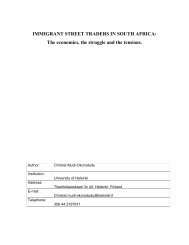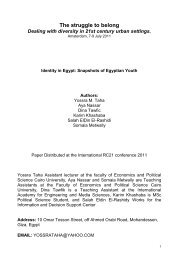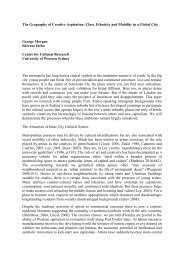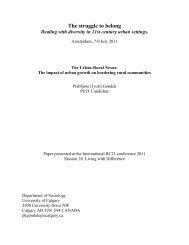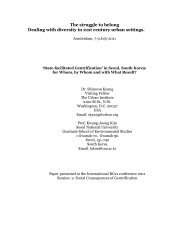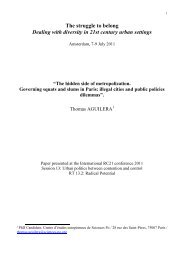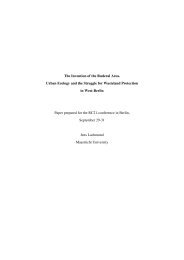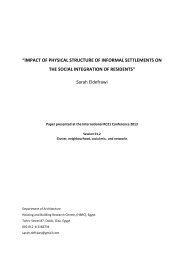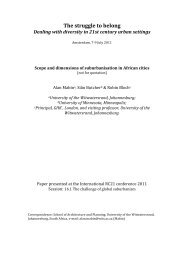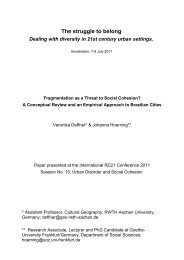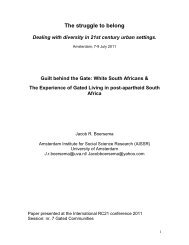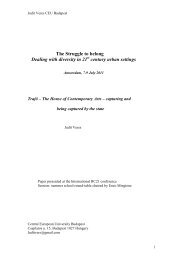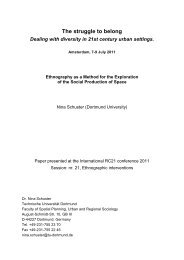Gentrification in the mill land areas of Mumbai city - RC21 ORG ...
Gentrification in the mill land areas of Mumbai city - RC21 ORG ...
Gentrification in the mill land areas of Mumbai city - RC21 ORG ...
Create successful ePaper yourself
Turn your PDF publications into a flip-book with our unique Google optimized e-Paper software.
Look! The hotel does not have any customer now. Who will come to this hotel All <strong>the</strong><br />
people have left this place. The tower people will not come to such k<strong>in</strong>d <strong>of</strong> hotel.<br />
Development has done noth<strong>in</strong>g positive related to our bus<strong>in</strong>ess.<br />
But when 19 years old Pramila utters that <strong>the</strong> man who irons nearby her chawl has <strong>in</strong>creased<br />
<strong>the</strong> rate from Rs 6 to Rs 13 per saree after <strong>the</strong> upcom<strong>in</strong>g <strong>of</strong> towers and <strong>the</strong>y had to stop giv<strong>in</strong>g<br />
clo<strong>the</strong>s to him or <strong>the</strong> people liv<strong>in</strong>g <strong>in</strong> <strong>the</strong> tower build<strong>in</strong>g receives more water from BMC than<br />
us, it showers a new light on <strong>the</strong> o<strong>the</strong>r side <strong>of</strong> <strong>the</strong> aspect.<br />
The formation <strong>of</strong> gated communities <strong>in</strong> and around <strong>the</strong> neighbourhood enhanced <strong>the</strong><br />
confrontation <strong>of</strong> self versus <strong>the</strong> o<strong>the</strong>rs. In order to get better facilities and larger amenities<br />
people are mov<strong>in</strong>g <strong>in</strong> to <strong>the</strong>se <strong>areas</strong> from around <strong>the</strong> world. It transforms <strong>in</strong>to a <strong>land</strong> <strong>of</strong><br />
multiple culture where <strong>the</strong> culture <strong>of</strong> <strong>the</strong> corporate world takes <strong>the</strong> dom<strong>in</strong>ant position and <strong>the</strong><br />
ethni<strong>city</strong> rema<strong>in</strong>s beh<strong>in</strong>d. The 24/7 services by <strong>the</strong> service providers with<strong>in</strong> <strong>the</strong>ir enclave<br />
makes <strong>the</strong>m isolated from <strong>the</strong> outer world. There is a creation <strong>of</strong> f<strong>in</strong>er wall between <strong>the</strong> two<br />
world <strong>of</strong> community based liv<strong>in</strong>g and <strong>the</strong> gated community <strong>in</strong> <strong>the</strong> neighbourhood. This is<br />
where ‘self’ confronts <strong>the</strong> ‘o<strong>the</strong>r’ and <strong>the</strong> “<strong>in</strong>dividual acquires a coherent identity <strong>of</strong> selfhood<br />
(Gard<strong>in</strong>er, 2000:76).”But accord<strong>in</strong>g to Mihir Mehta, Director <strong>of</strong> Mahalakshmi Silk Mills life<br />
doesn’t move <strong>in</strong> isolation. He stated that:<br />
People who th<strong>in</strong>k <strong>the</strong>y are is<strong>land</strong>er; <strong>the</strong>y can’t survive <strong>in</strong> <strong>the</strong> long run. They will<br />
survive <strong>in</strong> short run but at every stage people are <strong>in</strong>terdependent on <strong>the</strong> o<strong>the</strong>r <strong>land</strong>. We<br />
are <strong>in</strong>terdependent on our driver, <strong>in</strong>terdependent on our sweeper, maid servant who<br />
comes to our house to clean, <strong>in</strong>terdependent on <strong>the</strong> grocery guy, news paper guy and all<br />
<strong>the</strong> service provider people. We cannot really be an is<strong>land</strong>er as such. The people who say<br />
that <strong>the</strong>re are facility management <strong>in</strong> <strong>the</strong> gated community <strong>the</strong>y are collapsed. “Isko<br />
bhejo”, “usko bhejo” (send him or send her) but it really doesn’t work that way. It’s very<br />
simple to say “isko bhejo, usko bhejo” (send him or send her) but at <strong>the</strong> end <strong>of</strong> <strong>the</strong> day<br />
<strong>the</strong>re has to be a question <strong>of</strong> human <strong>in</strong>teraction. There has to be a mutual cohabitation <strong>of</strong><br />
both <strong>in</strong> order to susta<strong>in</strong> a balanced livelihood. (Mihir Mehta May 2013)<br />
On <strong>the</strong> o<strong>the</strong>r hand people who restrict <strong>the</strong>mselves to <strong>the</strong> old culture are also liv<strong>in</strong>g <strong>in</strong> gated<br />
community because change is <strong>in</strong>evitable and that has to be adapted. Therefore <strong>the</strong> question <strong>of</strong><br />
<strong>in</strong>clusion and exclusion comes <strong>in</strong> <strong>the</strong> process <strong>of</strong> “haussmanisation” (Harvey 2010:22) <strong>in</strong><br />
multiple ways.<br />
Spatial Transformation and Formal Informal Practices <strong>in</strong> <strong>the</strong> Commercial Area <strong>of</strong><br />
Neighbourhood<br />
The mapp<strong>in</strong>g <strong>of</strong> <strong>the</strong> area <strong>in</strong> <strong>the</strong> process <strong>of</strong> gentrification rema<strong>in</strong>s <strong>in</strong>complete without <strong>the</strong><br />
unpack<strong>in</strong>g <strong>of</strong> <strong>the</strong> commercial area its formal and <strong>in</strong>formal practices and <strong>the</strong> barga<strong>in</strong><strong>in</strong>g and<br />
negotiation attached to <strong>the</strong> everyday life. Sitaram Yadav Marg consists <strong>of</strong> rows <strong>of</strong> shop on



